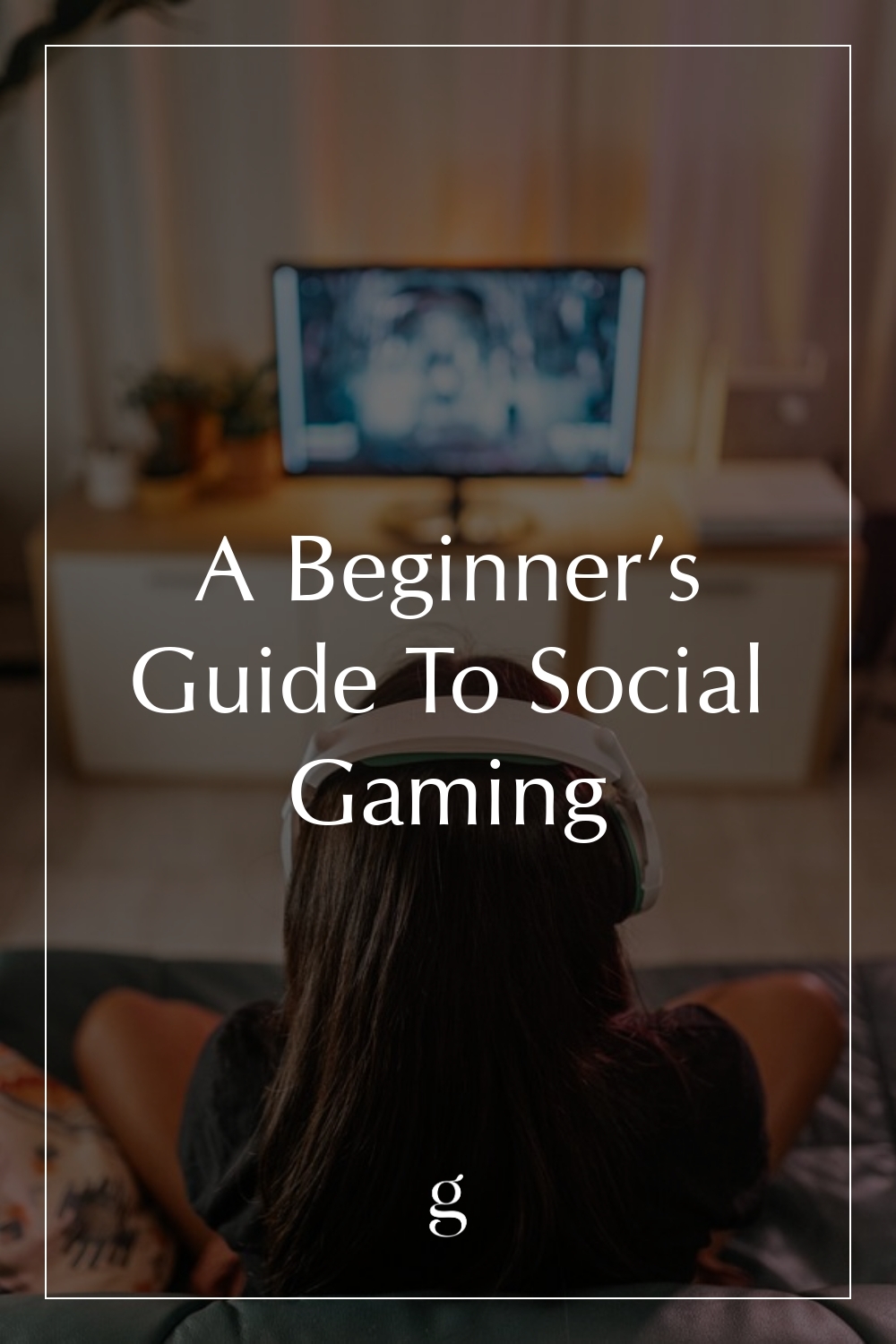
A Beginner’s Guide To Social Gaming
I play video games online with strangers.
But it didn’t start that way. I used to only play with my old college roommate as a way for us to keep in touch. We’d stay up late playing Fall Guys—a candy-colored obstacle course game. Across headsets and timezones, we’d talk about work, our pets, and our partners, just two introverts only ever speaking to each other.
Then one night, she floated the idea of playing Red Dead Redemption 2 Online. It’s a gritty Wild West game, she explained, and it would require playing with internet strangers. The dreaded player-versus-player (PvP) made my stomach drop, but I was curious and excited about trying something new. Yet I was terrified of being bad at something in front of said-strangers.
But after a couple of weeks of bravery and some light-to-mild experiences with trolls (phew, we were lucky), we stumbled across a posse of players in a virtual saloon fight. They were a welcoming and skilled group, supportive of beginners. And when they invited us to play with them, I suddenly found myself roped into the world of social gaming, making connections with strangers.
“Beyond the personas we were building for ourselves online, I discovered we were all just everyday people who wanted to play and connect with others.”
My friend and I began to spin off into other games with new friends we’d met along the way. Friday nights, once dulled by stay-at-home orders (and Netflix, honestly), became lively once more. We’d laugh to the breathless point of tears when someone inevitably crashed a helicopter—or a horse or a spaceship—ruining yet another seamless mission. (It was usually me.)
But beyond the personas we were building for ourselves online, I discovered we were all just everyday people who wanted to play and connect with others. Sure, there were the men who sneeringly asked me if I was “playing on my brother’s account.” 😒 But there were also the kindhearted youths who poked fun at my peppermint tea-drinking, the gamers who didn’t speak my language but stepped up to protect me in a tight spot, the players who sweet-talked their cats while on-mic. There was me, taking pauses to change out my laundry.
Gaming is a space where we are both known and unknown, as individual and anonymous as they come. I never thought that this virtual world—the world of social gaming—was for me. I was wrong.
Is There A Place In Gaming For Me?
Gaming is increasingly diverse, including more women gamers than you might think (research shows that women make up nearly half of all gamers.) The idea that gaming is “for the boys” stems partially from the visibility and influence in the industry, where men hold over 84% of top executive positions. And also, I’d argue that the visibility of the types of available games can feel intimidating, combative, and exclusionary. (Think Call of Duty or Mortal Kombat.)
But gaming is much more expansive than the ones we hear about most frequently in mainstream pop culture. Take No Man’s Sky and Animal Crossing, for example, which support multiplayer and single player experiences. Minecraft and Roblox are favorites for builders and game developers. And, of course, Journey was specifically and simply designed to welcome players to the social aspects of gaming; it’s a personal and perennial favorite.
“If you’re wondering whether you’re represented in the space, you are!”
So if you’re wondering whether you’re represented in the space, you are! It’s easy to paint ourselves with a broad brush as “just not the gaming type,” which is a mentality it’s time to let go of.
“There is a game for everyone,” assures Erika Ishii, who is the voice of headliner Valkyrie in season nine of Apex Legends (an online multiplayer battle royale game where the last team with a surviving member wins). “People think of games as a genre, instead of as a medium.”
Ishii, who has been gaming for as long as they can remember, notes how overlooked diversity in gaming can truly be. “A lot of women grew up gaming, and are making waves in the industry now. [They’re] very vocal about the kind of games that they love. I think the general population, and the industry itself, would do well to remember that.”
But how can a beginner jump into the world of PvP without panicking? And is it actually possible to make friends online?
“Gamers foster community,” says Ishii, particularly pointing to Twitch (where they are a streamer) as a community-focused entrance into the world of social gaming. There’s immediate feedback and discussion on the live-streaming site, and it offers a platform where players can see themselves reflected in ways they haven’t typically seen online. “My online community [is full of] people who don’t feel like we always connect with other people in real life,” Ishii notes. “We’ve found our people here.”
Where To Start & How To Introduce Yourself
So what if you, like me, want to put yourself out there and start meeting your people?
“One of the best ways to get started is actually to look for friendly, like-minded gaming communities outside of the games themselves,” says Morgan Romine, the Director of Initiatives at AnyKey, a nonprofit advocacy organization for inclusion in the gaming world.
Try to find gaming folks with shared interests, styles, or life experiences, she recommends, and watch gaming categories you enjoy on streaming sites like Twitch. “Game categories like Arcade, Puzzle, Mobile, Simulation, and Rhythm & Music can be more welcoming to newcomers,” explains Romine. “They also have non-gaming categories like Creative, Music, and Just Chatting that might still be game-related but are more about having fun and making friends.”
“Try to find gaming folks with shared interests, styles, or life experiences.”
If you haven’t yet invested in a gaming console or PC, Twitch can also help you decide on which communities and games are a good fit for you. (Because, of course, gaming does come with an up-front cost, though eBay and secondhand marketplaces are great for affordable, refurbished equipment, especially if you’re just getting started.)
Once you’re ready to engage more deeply, you can seek out Discord channels that are a fit for your gaming interests. “Discord is key and crucial,” explains Amy Brady, a former pro-gamer and co-founder of the competitive female gaming organization PMS Clan. “It’s where the communities are building their off-channel communications and groups.”
Essentially, start by finding a healthy group environment and people interested in playing the same games—and then branch off from there!
“Follow the social web of connections you make until you find the place you want to stick.”
“You see this snowball of communities within communities,” Brady says about her observations on sites like Twitch and Discord. “[Gamers] are meeting people, and being pulled in, and forming their own groups. It’s like how the culture builds sub-cultures—the community builds sub-communities.”
When you find a channel or community that resonates with you, head to the chat and introduce yourself—“Announce that you’re new and want to learn!” suggests Romine. “People who love a game are usually very excited to help out respectful newbies.” Find a way in, then follow the social web of connections you make until you find the place you want to stick.
How To Stay Safe When Gaming Online
“The community, as a whole, is very invested in safety and trying to minimize harassment,” Brady tells me, although there’s more work to do. “Brands have at least done a good job of trying to educate, even if they haven’t built their systems appropriately to help moderate.”
Prioritizing safety isn’t only a win for players; it’s a win for the industry as a whole—the more people who feel comfortable and safe on a platform, the more they’ll play. That’s why so many publishers are taking proactive measures, on both the social and the technical side, to prevent harassment online.
“Prioritizing safety isn’t only a win for players; it’s a win for the industry as a whole.”
My friend and I play under pseudonyms (as do most players I’ve met) and are careful around what details we share with new connections. Your gut is a good measure for who might be a longer-term pal and who is an immediate “block,” but it’s still essential to take communication slow. Especially, as Brady notes, if your voice identifies you as a person who might be a target for harassers.
“Set the expectation that if you’re online gaming and people are talking, whether you are or not, there’s going to be toxic behavior,” Brady says, while also noting that social and competitive rewards of gaming outweigh the negatives. Focus instead on the players who are vocal allies and draw a firm line regarding harassment. “You just can’t engage back,” she says. “You really just can’t argue with trolls.”
Does that sound stressful? You can even start more slowly, if you’d prefer, by turning single-player games into social ones. Romine looks to advice from Dr. Shira Chess’s book “Play Like a Feminist“: “[Single-player] mobile games like Monument Valley and Reigns: Her Majesty […] can be made social by creating group chats with friends to discuss the game, like a book club or sewing circle.”
It’s also important to take care of yourself and understand your boundaries—if player-versus-player combat overwhelms you (like it does for me), try a game that’s conducive to building, puzzle-solving, or storytelling. When you feel yourself tensing up, practice self-care like taking breaks, getting outside, and drinking plenty of water. As you play, you’ll realize how necessary these pauses are, and a supportive community will understand your limits and boundaries.
“As you play, you’ll realize how necessary pauses are, and a supportive community will understand your limits and boundaries.”
In the long-term, if you’ve established “your people” online, you can consider meeting IRL. A good vehicle to connect, according to Brady, is to meet at gaming expos and events where you can engage more deeply about the interest you’ve bonded over already. “Gaming events are showstoppers; you want to talk about being a part of something? When people go to events, it’s over.”
And if you don’t already have a network of gamer friends, or an old college buddy to play alongside, there are countless established communities for every type of player:
AnyKey is a nonprofit organization that offers programming to build a more inclusive and accessible gaming environment industry-wide. (Their affiliates page is a great resource for finding communities!)
PMS Clan is a video game community committed to breaking down walls, stereotypes, and boundaries for female gamers by providing a pro-women environment, fostering a competitive spirit, and building an inclusive support network for women and their allies.
I Need Diverse Games is a blog and safe, intersectional community space for gamers of color and other marginalized identities.
AbleGamers is a network and community organization that helps improve accessibility to gamers with disabilities on an individual and industry-wide level. They regularly stream on Twitch and have a Discord!
peer2peer.live is a directory of streamers (gamers and beyond) that list themselves using identity tags so viewers can find streamers like them.
Rainbow Arcade is a “family of LGBTQIA+ creators” dedicated to inclusion, positivity, and having fun within the gaming world—and beyond.
ExtraLife is a nonprofit that connects gamers through local community guilds, live streaming, and fundraising efforts that support children’s hospitals.
Sugar Gamers is a community space founded by a “Geek of all Trades” for women and other underrepresented and underserved people in gaming.
/r/GirlGamers is a Reddit and Discord for women and non-binary gamers.
If it’s not on this list, you’d be surprised to find what other spaces there are that will embrace you wholly. “Find some community that resonates with you,” Ishii encourages. “You deserve to feel welcome.”
There are more gamers than you’d think who hold the same values and interests as you, no matter what those are. Games are full of empathetic and delightful players—who are only a 👋 away from being your new virtual teammates. “The gaming world is just going to keep growing and evolving,” Ishii says. “Join us!”
And I agree. See you soon on the virtual playing field.
“Games are full of empathetic and delightful players—who are only a 👋 away from being your new virtual teammates.”
RELATED READING
Emily Torres is the Managing Editor at The Good Trade. Born and raised in Indiana, she studied Creative Writing and Business at Indiana University. You can usually find her in her colorful Los Angeles apartment journaling, caring for her rabbits, or gaming. Read more of her creative writing over on Notes To Self!


